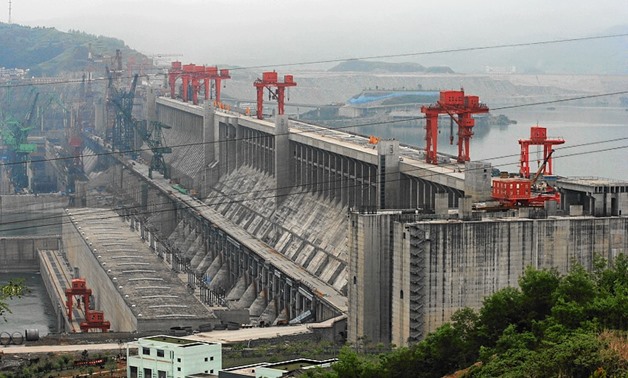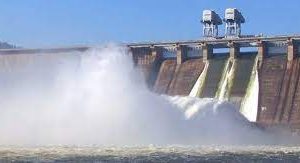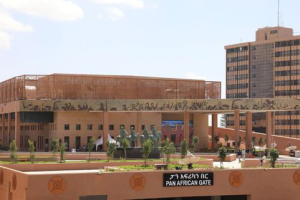
BY HAILE DEMEKE
Talks over the Grand Ethiopian Renaissance Dam have been ongoing for almost a decade now. But, Ethiopia, Sudan and Egypt have failed to reach a deal.
Parallel to the Covid-19 pandemic the issue absorbed the public attention, the negotiations among Egypt, Sudan and Ethiopia regarding the GERD hit the headlines of global and local media especially since the US government got involved as facilitator in the process as one of the most pressing diplomatic and political disputes in the continent and beyond.
In 2011, the government began construction of hydro dam which is fully funded by it. Once completed, the GERD will become Africa’s largest hydropower dam, with a capacity of 6000 megawatts of electricity, both for domestic consumption and export.
The three countries were negotiating over the dam frequently for the last ten years and still the negotiation between the three countries is as standstill. Different agreements are signed between the three countries in how to fill and operate the dam. In 2015, the three countries Egypt, Ethiopia and Sudan signed Declaration of Principles (DoP) in Khartoum to guide technical and political negotiations towards an agreement on the construction and operation of the GERD.
Despite the frequent negotiation over the dam the three countries were unable to agree on the issue and the Egyptian officials were repeatedly misleading the international community so as to maintain their colonial hegemony over the river. The colonial agreement treaties give a lion share to the Egypt while the country contributes zero percent to the river.
GERD Negotiating Team member and expert of Trans Boundary Rivers Dr. Yilma Sileshi told The Ethiopian Herald that so far, Ethiopia is not benefited from the river and the Egyptians portrayed the river as their only resources. Every country in the world needs water and there is no intention from Ethiopian side to harm the downstream countries. Ethiopia is constructing the dam for generating electricity.
The government of Ethiopia did good diplomatic activity in creating awareness to the international community and countering pressures from some external forces. Right after Ethiopia achieved the first round filling of the project, Egypt has been repeatedly requesting for external involvement. The government of Ethiopia has been reluctant to involve external mediators. For Ethiopia the project is matter of sovereignty and symbol of unity. This time its Egypt that is being accused of maintaining the colonial grip over the Nile, by defending the 1959 agreement between Egypt and Sudan, which allocates the river’s water between the two countries without taking into consideration the rights of upstream countries.
Since the commencement of the dam, Ethiopia has passed through three reigns and the stance of the government on the dam is similar even if there is exchange of power.
The two downstream countries have used the river without any care to the upstream countries and they imagine that the river is their sole property. They signed agreement which gives them the biggest share of the river.
The government of Ethiopia will commence the second round filling of the reservoir this summer during the rainy season without doubt.
While Ethiopia underwent successful diplomatic activity in global arena, the Egyptians were the biggest losers from the diplomatic world. Cairo is rushing here and there to prolong the second round filling sorting unnecessary excuse and blaming Ethiopia for nothing.
The Sudanese position on the GERD is more ambivalent. The project benefits the downstream countries especially Sudan it regulates floods to better manage irrigation of its vast plains, as well as cheap electricity imported from Ethiopia. Courted by both Egypt and Ethiopia, Sudan has been sending mixed signals and recently requested for quartet mediation composed of UN, EU, US and AU.
The argument about Egypt’s water poverty is perhaps its strongest card in the diplomatic wrangle, so as to gain international support. The Egyptian officials have so far failed to launch a concerted information campaign to win over global audience. In contrary Ethiopia is successful in winning global support and appear to have advanced much better. Trying all possible and fail to be successful, Egypt believes to take the issue back to the UN, EU, US aiming at ties the hands of Ethiopia.
Office of the National Council for the Coordination of Public Participation to the Construction of the Grand Ethiopian Renaissance Dam (GERD), Public Relations Head Hailu Abraham said that the public’s contribution is further strengthening after the first phase filling of the dam.
Apart from this successful diplomatic activity did by the government of Ethiopia the people residing in and outside the country were supporting the project continuously. The finance is raised by selling bonds and other means and so far the contribution of the public has reached over 15 billion birr since the commencement of the dam.
Prior to the reform the progress of the project is delayed due to many reasons and now after reform is launched the project showed steady progress and for the past couple of years the diplomatic activity did by the government further motivated the diasporas and they are highly engaging in supporting the project by all means. So far the public raised over 15 billion birr and this year the government will launch the second round filling and it is time to harvest the fruit of the project.
Spokesperson of Foreign Affairs of Ethiopia, Ambassador Dina Mufti, said that Ethiopia hasn’t received an official proposal to form a quartet committee that includes the European Union, the United Nations, the United States and the African Union to mediate the Grand Ethiopian Renaissance Dam (GERD) talks.
He said that Ethiopia always welcome negotiations and the issue can be resolved through the ongoing negotiations led by the African Union, and that the talks ‘does not require the participation of other parties. Ethiopia has always been committed to resolving issues through negotiations, in a way that addresses the concerns of Sudan and Egypt.
Ethiopia is keen to sustaining the African Union-led talks under the Chairmanship of the Democratic Republic of the Congo. Talks to change the modalities of the negotiations should be treated according to the provisions of the DOP, which was signed by the tripartite in 2015. Sudan has been provided with information on the security of the dam and the filling of the dam is part of the overall construction project.
The government of Ethiopia achieved first round filling last year and preparing for the second round filling in the coming July. Celebrating 10th year anniversary of the GERD Deputy Prime Minister and Foreign Minister of Ethiopia Demeke Mekonnen said that the project is a matter of ensuring equitable access to electric power and sovereignty.
He indicated that “no one can stop Ethiopia’s right to use its share of the Nile River. Now our focus is to continue the critically important activities in accordance to our plan”. Ethiopia will ensure “a better existence” for its citizens, and all Ethiopian should stand and work together so as to complete the remaining works of the project.
It was indicated that 79 percent of the construction is completed. Ethiopia aims to generate electricity from two turbines following the second phase of filling during the rainy months of July and August of this year.
The two countries Egypt and Sudan had agreed and decided for quartet mediation and, Sudan formally requested the United Nations, European Union, United States and the African Union to mediate the stalled tripartite negotiation.
Ethiopia reacted to it saying that only tripartite desirable to resolve the difference between the three countries on the operation and filling of the dam, and that the filling of the second phase will be conducted as planned in line with international laws.
The Ethiopian Herald April 3/2021





Создание и продвижение сайтов в Москве – https://savers.top. Полный спектр работ с сайтами. Контекстная и таргетированная реклама для продвижения сайта и социальных сетей в интернете. Реклама для вашего интернет-магазина. Чат-боты для бизнеса в Telegram и WhatsApp.